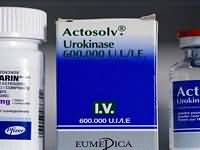Tryptophan

CLINICAL USE
Antidepressant
DOSE IN NORMAL RENAL FUNCTION
1–2 g 3 times daily
PHARMACOKINETICS
Molecular weight : 204.2 %Protein binding : 80 %Excreted unchanged in urine : 10 to 20 : Volume of distribution (L/kg) : 0.34–0.7 half-life – normal/ESRD (hrs) : 1–3 DOSE IN RENAL IMPAIRMENT
GFR (mL/MIN)
20 to 50 : Dose as in normal renal function 10 to 20 : Dose as in normal renal function <10 : Use lower doses initially DOSE IN PATIENTS UNDERGOING RENAL REPLACEMENT THERAPIES
CAPD : Unknown dialysability. Dose as in GFR <10 mL/min HD : Not dialysed. Dose as in GFR <10 mL/min HDF/high flux : Not dialysed. Dose as in GFR <10 mL/min CAV/VVHD : Unknown dialysability. Dose as in normal renal function IMPORTANT DRUG INTERACTIONS
Potentially hazardous interactions with other drugs Antidepressants: possible increased serotonergic effects with duloxetine; CNS excitation and confusion with MAOIs – reduce dose of tryptophan; agitation and nausea with SSRIs Antimalarials: avoid concomitant administration with artemether/ lumefantrine Sibutramine: increased risk of CNS toxicity – avoid concomitant use ADMINISTRATION
Reconstition
– Route
Oral Rate of Administration
– Comments
– OTHER INFORMATION
Associated with eosinophilia-myalgia syndrome, therefore not first line therapy .
See how to identify renal failure stages according to GFR calculation
See how to diagnose irreversible renal disease
Home









